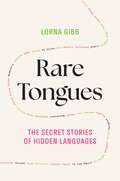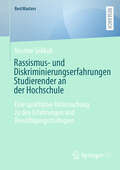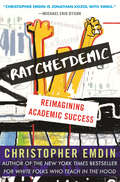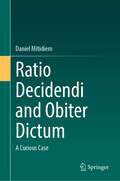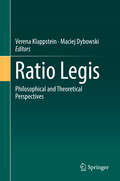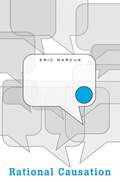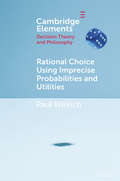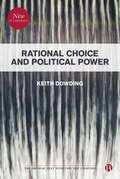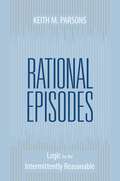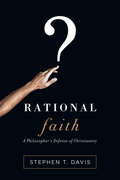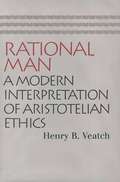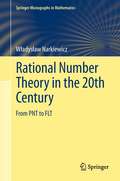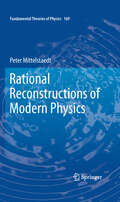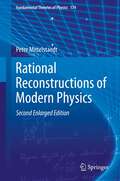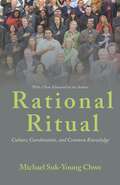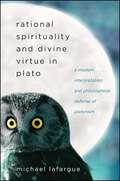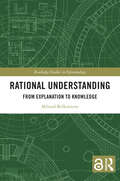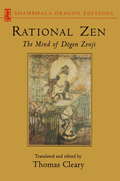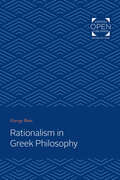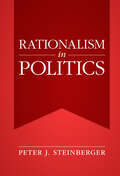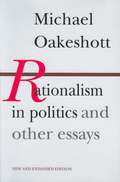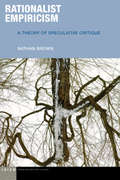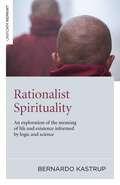- Table View
- List View
Rare Tongues: The Secret Stories of Hidden Languages
by Lorna GibbAn enthralling tour of the world&’s rarest and most endangered languagesLanguages and cultures are becoming increasingly homogenous, with the resulting loss of a rich linguistic tapestry reflecting unique perspectives and ways of life. Rare Tongues tells the stories of the world&’s rare and vanishing languages, revealing how each is a living testament to human resilience, adaptability, and the perennial quest for identity.Taking readers on a captivating journey of discovery, Lorna Gibb explores the histories of languages under threat or already extinct as well as those in resurgence, shedding light on their origins, development, and distinctive voices. She travels the globe—from Australia and Finland to India, the Canary Islands, Namibia, Scotland, and Paraguay—showing how these languages are not mere words and syntax but keepers of diverse worldviews, sites of ethnic conflict, and a means for finding surprising commonalities. Readers learn the basics of how various language systems work—with vowels and consonants, whistles and clicks, tonal inflections, or hand signs—and how this kaleidoscope of self-expression carries vital information about our planet, indigenous cultures and tradition, and the history and evolution of humankind.Rare Tongues is essential reading for anyone concerned about the preservation of endangered languages and an eloquent and disarmingly personal meditation on why the world&’s linguistic heritage is so fundamental to our shared experience—and why its loss should worry us all.
Rassismus- und Diskriminierungserfahrungen Studierender an der Hochschule: Eine qualitative Untersuchung zu den Erfahrungen und Bewältigungsstrategien (BestMasters)
by Nesrine SekkaliDie vorliegende Studie beleuchtet den bislang wenig erforschten Erfahrungsraum von Studierenden, die als Migrationsandere markiert werden und scheinbar alle Ungleichheiten überwunden haben. Das zentrale Anliegen dieser qualitativ-empirischen Untersuchung besteht in der Analyse der Rassismus- und Diskriminierungserfahrungen rassifizierter Studierender sowie ihrer Bewältigungsstrategien. Die Ergebnisse der mit dem Preis für herausragende Masterarbeiten des Interdisziplinären Zentrums für Migrations- und Integrationsforschung der Universität Duisburg-Essen ausgezeichneten Studie verdeutlichen eindrücklich, dass eine umfassende Auseinandersetzung der Hochschule mit dem Thema Rassismus dringend erforderlich ist.
Ratchetdemic: Reimagining Academic Success
by Christopher EmdinA revolutionary new educational model that encourages educators to provide spaces for students to display their academic brilliance without sacrificing their identitiesBuilding on the ideas introduced in his New York Times best-selling book, For White Folks Who Teach in the Hood, Christopher Emdin introduces an alternative educational model that will help students (and teachers) celebrate ratchet identity in the classroom. Ratchetdemic advocates for a new kind of student identity—one that bridges the seemingly disparate worlds of the ivory tower and the urban classroom. Because modern schooling often centers whiteness, Emdin argues, it dismisses ratchet identity (the embodying of &“negative&” characteristics associated with lowbrow culture, often thought to be possessed by people of a particular ethnic, racial, or socioeconomic status) as anti-intellectual and punishes young people for straying from these alleged &“academic norms,&” leaving young people in classrooms frustrated and uninspired. These deviations, Emdin explains, include so-called &“disruptive behavior&” and a celebration of hip-hop music and culture. Emdin argues that being &“ratchetdemic,&” or both ratchet and academic (like having rap battles about science, for example), can empower students to embrace themselves, their backgrounds, and their education as parts of a whole, not disparate identities. This means celebrating protest, disrupting the status quo, and reclaiming the genius of youth in the classroom.
Ratio Decidendi and Obiter Dictum: A Curious Case
by Daniel MitidieroThis book explores the concepts of ratio decidendi and obiter dictum from a historical-comparative perspective. It provides a comprehensive review of legal doctrine on precedent, delving into English and American Law so to illustrate its applicability to the Brazilian legal system. How we deal with precedents is its main topic. Definitions within legal fields have always been subject to significant debate, with some recurring more often than others. Every now and then, a perspective arises which transforms the orthodoxy. As such is the case with the notion of precedent. Outlining its contours establishes a continuity between disparate and temporally distinct traditions. It requires theoretical-philosophical speculation, historical-comparative sense, and attention to the particularities of Brazilian Law. This book includes in-depth discussions of the development of the various understandings of the ratio, outlines the notions of ratio decidendi and obiter dictum, and illustrates its application within legal practice. It suggests an understating of the ratio capable of dealing with identical, similar and distinct issues in the Brazilian legal system. Following an extensive debate on the characterisation of the ratio, it explores the notion of obiter dictum, its definition, abilities and effects. The target audience of this book includes researchers, scholars and practitioners, especially those interested in the practice of precedent from a perspective that intertwines legal theory, legal history and comparative law.
Ratio Legis: Philosophical And Theoretical Perspectives
by Verena Klappstein Maciej DybowskiThe book is dedicated to the theoretical problems concerning ratio legis. In the contexts of legal interpretation and legal reasoning, the two most important intellectual tools employed by lawyers, ratio legis would seem to offer an extremely powerful argument. Declaring the ratio legis of a statute can lead to a u-turn argumentation throughout the lifespan of the statute itself – in parliament, or in practice during court sessions, when it is tested against the constitution.Though the ratio legis argument is widely used, much about it warrants further investigation. On the general philosophical map there are many overlapping areas that concern different approaches to human rationality and to the problems of practical reasoning. Particular problems with ratio legis arise in connection with different perspectives on legal philosophy and theory, especially in terms of the methods that lawyers use for legal interpretation and argumentation. These problems can be further subdivided into particular aspects of activities undertaken by lawyers and officials who use the ratio legis in their work, and the underlying theories. In short, this book examines what ratio legis is, what it could be, and its practical implications.
Rational Causation
by Eric MarcusWe explain what people think and do by citing their reasons, but how do such explanations work, and what do they tell us about the nature of reality? Contemporary efforts to address these questions are often motivated by the worry that our ordinary conception of rationality contains a kernel of supernaturalism-a ghostly presence that meditates on sensory messages and orchestrates behavior on the basis of its ethereal calculations. In shunning this otherworldly conception, contemporary philosophers have focused on the project of naturalizing the mind, viewing it as a kind of machine that converts sensory input and bodily impulse into thought and action. Eric Marcus rejects this choice between physicalism and supernaturalism as false and defends a third way. He argues that philosophers have failed to take seriously the idea that rational explanations postulate a distinctive sort of causation-rational causation. Rational explanations do not reveal the same sorts of causal connections that explanations in the natural sciences do. Rather, rational causation draws on the theoretical and practical inferential abilities of human beings. Marcus defends this position against a wide array of physicalist arguments that have captivated philosophers of mind for decades. Along the way he provides novel views on, for example, the difference between rational and nonrational animals and the distinction between states and events.
Rational Choice Using Imprecise Probabilities and Utilities (Elements in Decision Theory and Philosophy)
by Paul WeirichAn agent often does not have precise probabilities or utilities to guide resolution of a decision problem. I advance a principle of rationality for making decisions in such cases. To begin, I represent the doxastic and conative state of an agent with a set of pairs of a probability assignment and a utility assignment. Then I support a decision principle that allows any act that maximizes expected utility according to some pair of assignments in the set. Assuming that computation of an option's expected utility uses comprehensive possible outcomes that include the option's risk, no consideration supports a stricter requirement.
Rational Choice and Political Power
by Keith DowdingFeaturing a substantial new introduction and two new chapters in the Postscript, this new edition makes one of the most significant works on power available in paperback and online for the first time. The author extensively engages with a body of new literature to elucidate and expand upon the original work, using rational choice theory to provide: • An examination of how, due to the collective action problem, groups can be powerless despite not facing any resistance • Timely engagement with feminist accounts of power • An explanation of the relationship of structure and agency and how to measure power comparatively across societies This book’s unique interaction with both classical and contemporary debates makes it an essential resource for anyone teaching or studying power in the disciplines of sociology, philosophy, politics or international relations.
Rational Decision and Causality
by Ellery EellsFirst published in 1982, Ellery Eells' original work on rational decision making had extensive implications for probability theorists, economists, statisticians and psychologists concerned with decision making and the employment of Bayesian principles. His analysis of the philosophical and psychological significance of Bayesian decision theories, causal decision theories and Newcomb's paradox continues to be influential in philosophy of science. His book is now revived for a new generation of readers and presented in a fresh twenty-first-century series livery, including a specially commissioned preface written by Brian Skyrms, illuminating its continuing importance and relevance to philosophical enquiry.
Rational Episodes: Logic for the Intermittently Reasonable
by Keith M. ParsonsLogic is the skill that enables humans to think clearly, accurately, and rigorously and so to draw only the inferences that the evidence warrants. Some people, like scientists, engineers, mathematicians, and computer programmers, get plenty of on-the-job practice in thinking logically. The rest of us generally don't. In this accessible, concise yet comprehensive introduction to a sometimes-formidable subject, philosopher Keith Parsons presents elementary topics in logic for people who have little background in mathematics or science and have no career goals in those fields. Parsons presupposes no specialized background and strives to introduce even abstract concepts in an intuitive and unintimidating way. His informal, conversational style leads the reader painlessly, even entertainingly, through three essential areas of logic. The first part of the book deals with sentential and predicate logic, as well as inductive and scientific reasoning, including inference to the best explanation. The second part explains basic probability, Bayes' Theorem, and why thinking about probability is so prone to error and illusion. The third part considers informal reasoning and critical thinking, including such topics as rhetoric, fallacies, political spin, and the detection of pseudoscience and pseudohistory. Why be logical? Even if you're a poet, an artist, or just a free spirit, logic can help you determine the facts behind the political propaganda, religious claims, advertising, and sales talk that we are all subjected to. As a logically literate person, you will be a better-informed citizen, wiser consumer, and a clearer thinker.
Rational Faith: A Philosopher's Defense of Christianity (Veritas Books)
by Stephen T. DavisWhy believe in God?
Rational Man: A Modern Interpretation Of Aristotelian Ethics
by Douglas B. Rasmussen Henry Babcock VeatchForty years after its original publication, Liberty Fund brings back to print Henry Veatch's path-breaking popular presentation of virtue ethics. This modern interpretation of Aristotelian ethics is a natural for undergraduate philosophy courses. It is also an engaging work for the expert and the beginner alike, offering a middle ground between existential and analytic ethics. Veatch argues for the existence of ethical knowledge, and he reasons that this knowledge is grounded in human nature. Yet he contends that the moral life is not merely one of following rules or recipes, nor is human well-being something simple. Rather, the moral life, which Veatch calls #147;rational or intelligent living," is the life of practical wisdom where individual judgment of the particular and the contingent is paramount. Veatch's Rational Man offers a pluralistic understanding of human well-being without lapsing into moral relativism. For those interested in morality and liberty, Rational Man offers fertile ground for developing an account of free and responsible persons. It has profoundly influenced the work of Den Uyl, Campbell, Machan, Miller, Mack, and many others. Henry Babcock Veatch (1911#150;1999) was born in Evansville, Indiana, and educated at Harvard. He was recognized as one of the leading neo-Aristotelian philosophers of the twentieth century. Besides Rational Man, he was the author of Intentional Logic; Realism and Nominalism Revisited; Aristotle: A Contemporary Appreciation; and many others.
Rational Number Theory in the 20th Century
by Władysław NarkiewiczThe last one hundred years have seen many important achievements in the classical part of number theory. After the proof of the Prime Number Theorem in 1896, a quick development of analytical tools led to the invention of various new methods, like Brun's sieve method and the circle method of Hardy, Littlewood and Ramanujan; developments in topics such as prime and additive number theory, and the solution of Fermat's problem. Rational Number Theory in the 20th Century: From PNT to FLT offers a short survey of 20th century developments in classical number theory, documenting between the proof of the Prime Number Theorem and the proof of Fermat's Last Theorem. The focus lays upon the part of number theory that deals with properties of integers and rational numbers. Chapters are divided into five time periods, which are then further divided into subject areas. With the introduction of each new topic, developments are followed through to the present day. This book will appeal to graduate researchers and student in number theory, however the presentation of main results without technicalities will make this accessible to anyone with an interest in the area.
Rational Reconstructions of Modern Physics
by Peter MittelstaedtNewton’s classical physics and its underlying ontology are loaded with several metaphysical hypotheses that cannot be justified by rational reasoning nor by experimental evidence. Furthermore, it is well known that some of these hypotheses are not contained in the great theories of modern physics, such as the theory of relativity and quantum mechanics. This book shows that, on the basis of Newton’s classical physics and by rational reconstruction, the theory of relativity as well as quantum mechanics can be obtained by partly eliminating or attenuating the metaphysical hypotheses. Moreover, it is shown that these reconstructions do not require additional hypotheses or new experimental results.
Rational Reconstructions of Modern Physics, 2nd Enlarged Edition
by Peter MittelstaedtNewton's classical physics and its underlying ontology are loaded with several metaphysical hypotheses that cannot be justified by rational reasoning nor by experimental evidence. Furthermore, it is well known that some of these hypotheses are not contained in the great theories of Modern Physics, such as the theory of Special Relativity and Quantum Mechanics. This book shows that, on the basis of Newton's classical physics and by rational reconstruction, the theory of Special Relativity as well as Quantum Mechanics can be obtained by partly eliminating or attenuating the metaphysical hypotheses. Moreover, it is shown that these reconstructions do not require additional hypotheses or new experimental results. <P><P> In the second edition the rational reconstructions are completed with respect to General Relativity and Cosmology. In addition, the statistics of quantum objects is elaborated in more detail with respect to the rational reconstruction of quantum mechanics. The new material completes the approach of the book as much as it is possible at the present state of knowledge. Presumably, the most important contribution that is added to the second edition refers to the problem of interpretation of the three great theories of Modern Physics. It is shown in detail that in the light of rational reconstructions even realistic interpretations of the three theories of Modern Physics are possible and can easily be achieved.
Rational Ritual: Culture, Coordination, and Common Knowledge
by Michael Suk-Young ChweWhy do Internet, financial service, and beer commercials dominate Super Bowl advertising? How do political ceremonies establish authority? Why does repetition characterize anthems and ritual speech? Why were circular forms favored for public festivals during the French Revolution? This book answers these questions using a single concept: common knowledge. Game theory shows that in order to coordinate its actions, a group of people must form "common knowledge." Each person wants to participate only if others also participate. Members must have knowledge of each other, knowledge of that knowledge, knowledge of the knowledge of that knowledge, and so on. Michael Chwe applies this insight, with striking erudition, to analyze a range of rituals across history and cultures. He shows that public ceremonies are powerful not simply because they transmit meaning from a central source to each audience member but because they let audience members know what other members know. For instance, people watching the Super Bowl know that many others are seeing precisely what they see and that those people know in turn that many others are also watching. This creates common knowledge, and advertisers selling products that depend on consensus are willing to pay large sums to gain access to it. Remarkably, a great variety of rituals and ceremonies, such as formal inaugurations, work in much the same way. By using a rational-choice argument to explain diverse cultural practices, Chwe argues for a close reciprocal relationship between the perspectives of rationality and culture. He illustrates how game theory can be applied to an unexpectedly broad spectrum of problems, while showing in an admirably clear way what game theory might hold for scholars in the social sciences and humanities who are not yet acquainted with it. In a new afterword, Chwe delves into new applications of common knowledge, both in the real world and in experiments, and considers how generating common knowledge has become easier in the digital age.
Rational Spirituality and Divine Virtue in Plato: A Modern Interpretation and Philosophical Defense of Platonism
by Michael LaFargueMichael LaFargue presents an important and accessible aspect of Plato's legacy largely overlooked today: a variety of personal spirituality based on reason and centered on virtue. Plato's Virtue-Forms are transcendent in their goodness, ideals that Platonists can use to improve character and become like God so far as is humanly possible. LaFargue constructs a model of inductive Socratic reasoning capable of acquiring knowledge of these perfect Virtue-Forms, then scales back claims about these Forms to what can be supported by this kind of reasoning. This is a critical theory, but also a pluralistic one that accommodates modern cultural diversity. A how-to chapter provides detailed descriptions of the rules of Socratic reasoning basic to this spirituality, which any interested individual can practice today. LaFargue supports his interpretation by a close reading of the Greek text of key passages in Plato's dialogues. The work also undertakes a broader philosophical consideration, discussing the philosophical foundations proposed for this Platonism in relation to the thought of G. E. Moore, Ludwig Wittgenstein, Martin Heidegger, Friedrich Nietzsche, and Richard Rorty.
Rational Understanding: From Explanation to Knowledge (Routledge Studies in Epistemology)
by Miloud BelkonieneThis book develops a novel account of the connections between justification, understanding and knowledge. It lays the foundation for a more systematic and interconnected treatment of these central notions in epistemology. The author’s key move is to show first that a specific conception of doxastic justification constitutes our best point of entry into questions pertaining to a subject’s ability to secure understanding of reality. Second, that the traditional order of analysis when it comes to the connection between understanding and knowledge should be reversed: knowledge itself is best conceived of in terms of a specific type of understanding. Rational Understanding will appeal to scholars and advanced students working in epistemology and philosophy of science.
Rational Understanding: From Explanation to Knowledge (Routledge Studies in Epistemology)
by Miloud BelkonieneThis book develops a novel account of the connections between justification, understanding, and knowledge. It lays the foundation for a more systematic and interconnected treatment of these central notions in epistemology.The author’s key move is to show first that a specific conception of doxastic justification constitutes our best point of entry into questions pertaining to a subject’s ability to secure understanding of reality. Second, that the traditional order of analysis when it comes to the connection between understanding and knowledge should be reversed: knowledge itself is best conceived of in terms of a specific type of understanding.Rational Understanding will appeal to scholars and advanced students working in epistemology and philosophy of science.The Open Access version of this book, available at www.taylorfrancis.com, has been made available under a Creative Commons Attribution-Non Commercial-No Derivatives 4.0 license.
Rational Zen: The Mind of Dogen Zenji
by Thomas ClearyZen has often been portrayed as being illogical and mystifying, even aimed at the destruction of the rational intellect. These new translations of the thirteenth-century Zen master Dogen--one of most original and important Zen writers--illustrate the rational side of Zen, which has been obscured through the centuries, tainting people's understanding of it. Rational Zen consists of enlightening selections from Dogen's two masterworks, "Treasury of Eyes of True Teaching" (the famed Shobogenzo, Japan's most sophisticated philosophical work) and "Universal Book of Eternal Peace," which until now has been unavailable in English. The translator also provides explanations of the inner meanings of Dogen's writings and sayings--the first commentaries of their kind of English. A compendium of authentic source materials further enhances the reader's insight into Dogen's methods, linking them to the great classical traditions of Buddhism that ultimately flowered in Zen.
Rationalism in Greek Philosophy
by George BoasOriginally published in 1961. Greek philosophers were concerned with the distinction between appearance and reality, and all the differences in their philosophic systems were ultimately predicated on their different views of this distinction. The history of Greek rationalism is, then, a study of the changing basis of Greek philosophy. George Boas provides a historical account of rationalism in classical philosophy. He focuses on four central topics: the distinction between appearance and reality, the method used to establish the distinction, the appraisal of life made by the philosophers studied, and their ethical theories.
Rationalism in Politics
by Peter J. SteinbergerArguing against emergent and even dominant tendencies of recent political thought that emphasize the so-called primacy of affect, Peter Steinberger challenges political theorists to take account of important themes in philosophy on the topic of human rationality. He engages with major proponents of post-Kantian thought, analytic and continental alike, to show how political judgment and political action, properly understood, are deeply and definitively grounded in considerations of human reason. Focusing especially on influential arguments in the philosophy of mind and the philosophy of action, he seeks to rediscover and reanimate the close connection between systematic philosophical speculation on the one hand and the theory and practice of politics on the other. The result is a neo-rationalist conception of judgment and action that promises to offer a substantial and compelling account of political enterprise as it plays out in the real world of public affairs.
Rationalism in Politics and Other Essays
by Michael OakeshottRationalism in Politics, first published in 1962, has established the late Michael Oakeshott as the leading conservative political theorist in modern Britain. This expanded collection of essays astutely points out the limits of "reason" in rationalist politics. Oakeshott criticizes ideological schemes to reform society according to supposedly "scientific" or rationalistic principles that ignore the wealth and variety of human experience. "Rationalism in politics," says Oakeshott, "involves a misconception with regard to the nature of human knowledge. " History has shown that it produces unexpected, often disastrous results. "Having cut himself off from the traditional knowledge of his society, and denied the value of any education more extensive than a training in a technique of analysis," the Rationalist succeeds only in undermining the institutions that hold civilized society together. In this regard, rationalism in politics is "a corruption of the mind. "
Rationalist Empiricism: A Theory of Speculative Critique (Idiom: Inventing Writing Theory)
by Nathan BrownTwenty-first-century philosophy has been drawn into a false opposition between speculation and critique. Nathan Brown shows that the key to overcoming this antinomy is a re-engagement with the relation between rationalism and empiricism. If Kant’s transcendental philosophy attempted to displace the opposing priorities of those orientations, any speculative critique of Kant will have to re-open and consider anew the conflict and complementarity of reason and experience. Rationalist Empiricism shows that the capacity of reason and experience to extend and yet delimit each other has always been at the core of philosophy and science. Coordinating their discrepant powers, Brown argues, is what enables speculation to move forward in concert with critique.Sweeping across ancient, modern, and contemporary philosophy, as well as political theory, science, and art, Brown engages with such major thinkers as Plato, Descartes, Hume, Hegel, Marx, Heidegger, Bachelard, Althusser, Badiou, and Meillassoux. He also shows how the concepts he develops illuminate recent projects in the science of measurement and experimental digital photography. With conceptual originality and argumentative precision, Rationalist Empiricism reconfigures the history and the future of philosophy, politics, and aesthetics.
Rationalist Spirituality: An Exploration of the Meaning of Life and Existence Informed by Logic and Science
by Bernardo KastrupWhy does the universe exist and what are you supposed to do in it? This question has been addressed by religions since time immemorial, but popular answers often fail to account for obvious aspects of reality. Indeed, if God knows everything, why do we need to learn through pain and suffering? If God is omnipotent, why are we needed to do good? If the universe is fundamentally good, why are wars, crime, and injustice all around us? In modern society, orthodox science takes the rational high-ground and tackles these contradictions by denying the very need for, and the existence of, meaning. Indeed, many of us implicitly accept the notion that rationality somehow contradicts spirituality. That is a modern human tragedy, not only for its insidiousness, but for the fact that it is simply not true. In this book, the author constructs a coherent and logical argument for the meaning of existence, informed by science itself. A framework is laid out wherein all aspects of human existence have a logical, coh
